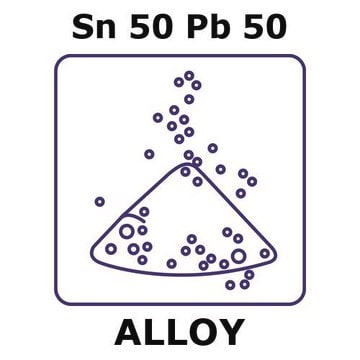GF99153085
Lead
rod, 200mm, diameter 50mm, 99.95%
Sinonimo/i:
Lead, PB007960
About This Item
Prodotti consigliati
Saggio
≥99.95%
Forma fisica
rod
Produttore/marchio commerciale
Goodfellow 991-530-85
Resistività
20.65 μΩ-cm
P. eboll.
1740 °C (lit.)
Punto di fusione
327.4 °C (lit.)
Stringa SMILE
[Pb]
InChI
1S/Pb
WABPQHHGFIMREM-UHFFFAOYSA-N
Descrizione generale
Note legali
Avvertenze
Danger
Indicazioni di pericolo
Consigli di prudenza
Classi di pericolo
Aquatic Acute 1 - Aquatic Chronic 1 - Lact. - Repr. 1A - STOT RE 1 Oral
Organi bersaglio
Central nervous system,Blood,Immune system,Kidney
Codice della classe di stoccaggio
6.1C - Combustible acute toxic Cat.3 / toxic compounds or compounds which causing chronic effects
Classe di pericolosità dell'acqua (WGK)
nwg
Punto d’infiammabilità (°F)
Not applicable
Punto d’infiammabilità (°C)
Not applicable
Certificati d'analisi (COA)
Cerca il Certificati d'analisi (COA) digitando il numero di lotto/batch corrispondente. I numeri di lotto o di batch sono stampati sull'etichetta dei prodotti dopo la parola ‘Lotto’ o ‘Batch’.
Possiedi già questo prodotto?
I documenti relativi ai prodotti acquistati recentemente sono disponibili nell’Archivio dei documenti.
Il team dei nostri ricercatori vanta grande esperienza in tutte le aree della ricerca quali Life Science, scienza dei materiali, sintesi chimica, cromatografia, discipline analitiche, ecc..
Contatta l'Assistenza Tecnica.



